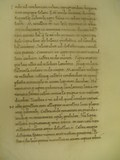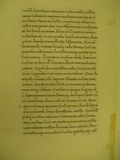Lima Public Library Leaf 39
This leaf comes from a rare manuscript of Livy's History of Rome (completed in about 9 A.D.) copied in Italy in the middle of the fifteenth century. It measures 22.5 x 16 cm and its vellum is very well prepared, though some rubbing of the ink has cast a shadow over the text block of some pages. The Humanistic script is crisp, clear, and without adornment; an exception is the Denison leaf, with its striking initial "H." See Denison University Leaf 39 for more information about this manuscript.
Text: This leaf contains the text of Livy's History, Book 27, Chapters 12-13. The English translation is that of Cyrus Edmonds (1850), via Project Gutenberg.
 Lima Leaf 39 Recto
Lima Leaf 39 Recto
Lima Public Library Leaf 39 Recto
 Lima Leaf 39 Recto Transcription
Lima Leaf 39 Recto Transcription
[12] Inde ad Cauloniam urbem oppugnandam. imperata non impigre solum sed etiam avide exsecuti direptis fugatisque cultoribus agri summa vi urbem oppugnabant. Marcellus et consulis litteris excitus et quia ita induxerat in animum neminem ducem Romanum tam parem Hannibali quam se esse, ubi primum in agris pabuli copia fuit ex hibernis profectus ad Canusium Hannibali occurrit. sollicitabat ad defectionem Canusinos Poenus; ceterum ut appropinquare Marcellum audivit, castra inde movit. aperta erat regio, sine ullis ad insidias latebris; itaque in loca saltuosa cedere inde coepit. Marcellus vestigiis instabat castraque castris conferebat, et opere perfecto extemplo in aciem legiones educebat. Hannibal turmatim per equites peditumque iaculatores levia certamina serens casum universae pugnae non necessarium ducebat. tractus est tamen ad id quod vitabat certamen. Nocte praegressum adsequitur locis planis ac patentibus Marcellus; castra inde ponentem pugnando undique in munitores operibus prohibet. ita signa conlata pugnatumque totis copiis, et cum iam nox instaret Marte aequo discessum est. castra exiguo distantia spatio raptim ante noctem permunita. postero die luce prima Marcellus in aciem copias eduxit;
 Lima Leaf 39 Recto Translation
Lima Leaf 39 Recto Translation
[12.] Having finished every thing which was to be done in Rome, the consuls set out for the war. Fulvius first went advance to Capua; in a few days Fabius followed. He implored his colleague in person, and Marcellus by a letter use the most vigorous measures to detain Hannibal, while he was making an attack upon Tarentum. That when that city was taken from the enemy, who had been repulsed on all sides and had no place where he might make a stand or look back up as a safe retreat, he would not then have even a pretext for remaining in Italy. He also sent a messenger to Rhegium, the praefect of the garrison, which had been placed there the consul Laevinus, against the Bruttians, and consisted eight thousand men, the greater part of whom had been brought from Agathyrna in Sicily, as has been before mentioned, and were men who had been accustomed to live by rapine. To these were added fugitives of the Bruttians natives of that country, equal to them in daring, and under an equal necessity of braving every thing. This band ordered to be marched, first, to lay waste the Bruttian territory, and then to attack the city Caulonia. After having executed the order, not only with alacrity, but avidity, and having pillaged and put to flight the cultivators of the land they attacked the city with the utmost vigour. Marcellus incited by the letter of the consul, and because he had made up his mind that no Roman general was so good a match for Hannibal as himself, set out from his winter quarters as soon as there was plenty of forage in the fields, and met Hannibal at Canusium. The Carthaginian was then endeavouring to induce the Canusians to revolt, but as soon as he heard that Marcellus was approaching, he decamped thence. The country was open, without any covers adapted for an ambuscade; he therefore began to retire thence into woody districts. Marcellus closely pursued him, pitched his camp close to his, and when he had completed his works, led out his troops into the field. Hannibal engaged in slight skirmishes, and sent out single troops of horse and the spearmen from his infantry, not considering it necessary to hazard a general battle. He was, however, drawn on to a contest of that kind which he was avoiding. Hannibal had decamped by night, but was overtaken by Marcellus in a plain and open country. Then, while encamping, Marcellus, by attacking the workmen on all hands, prevented the completion of his works. Thus a pitched battle ensued, and all their forces were brought into action; but night coming on, they retired from an equal contest. They then hastily fortified their camps, which were a small space apart, before night. The next day, as soon as it was light, Marcellus led out his troops into the field;
 Lima Leaf 39 Verso
Lima Leaf 39 Verso
Lima Public Library Leaf 39 Verso
 Lima Leaf 39 Verso Transcription
Lima Leaf 39 Verso Transcription
nec Hannibal detractavit certamen, multis verbis adhortatus milites ut memores Trasumenni Cannarumque contunderent ferociam hostis: urgere atque instare eum; non iter quietos facere, non castra ponere pati, non respirare aut circumspicere; cottidie simul orientem solem et Romanam aciem in campis videndam esse; si uno proelio haud incruentus abeat, quietius deinde tranquilliusque eum bellaturum. his inritati adhortationibus simulque taedio ferociae hostium cottidie instantium lacessentiumque acriter proelium ineunt. pugnatum amplius duabus horis est. cedere inde ab Romanis dextra ala et extraordinarii coepere. quod ubi Marcellus vidit, duodevicesimam legionem in primam aciem inducit. dum alii trepide cedunt, alii segniter subeunt, turbata tota acies est, dein prorsus fusa, et vincente pudorem metu terga dabant. cecidere in pugna fugaque ad duo milia et septingenti civium sociorumque; in iis quattuor Romani centuriones, duo tribuni militum, M. Licinius et M. Helvius. Signa militaria quattuor de ala prima quae fugit, duo de legione quae cedentibus sociis successerat amissa. [13] Marcellus postquam in castra reditum est, contionem adeo saevam atque acerbam apud milites habuit ut proelio per diem totum infeliciter tolerato tristior iis irati ducis oratio esset. 'dis immortalibus, ut in tali re, laudes gratesque' inquit 'ago quod
 Lima Leaf 39 Verso Translation
Lima Leaf 39 Verso Translation
...nor did Hannibal decline the challenge, but exhorted his soldiers at great length, desiring them "to remember Trasimenus and Cannae, and thus quell the proud spirit of their enemies." He said, "the enemy pressed upon him, and trod upon their heels; that he did not allow them to pass unmolested, pitch their camp, or even take breath and look around them; that every day, the rising sun and the Roman troops in battle-array were to be seen together on the plains. But if in one battle he should retire from the field, not without loss of blood, he would then prosecute the war more steadily and quietly." Fired by these exhortations, and at the same time wearied with the presumption of the enemy, who daily pressed upon them and provoked them to an engagement, they commenced the battle with spirit. The battle continued for more than two hours, when the right wing of the allies and the chosen band began to give way on the part of the Romans; which Marcellus perceiving, led the eighteenth legion to the front. While some were retiring in confusion, and others were coming up reluctantly, the whole line was thrown into disorder, and afterwards completely routed; while their fears getting the better of their sense of shame, they turned their backs. In the battle and in the flight there fell as many as two thousand seven hundred of the citizens and allies; among which were four Roman centurions and two military tribunes, Marcus Licinius and Marcus Helvius. Four military standards were lost by the wing which first fled, and two belonging to the legion which came up in place of the retiring allies. [13.] Marcellus, on his return to the camp, delivered an address to his soldiers so severe and acrimonious, that the words of their exasperated general were more painful to them than what they had suffered in the unsuccessful battle during the whole day. "I praise and thank the immortal gods," said he "that in such an affair the victorious enemy did not assail our very camp...